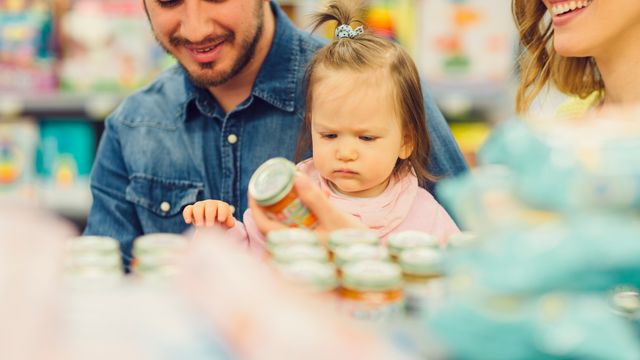Register for free to listen to this article
Thank you. Listen to this article using the player above. ✖
Want to listen to this article for FREE?
Complete the form below to unlock access to ALL audio articles.
Parents in Australia are being misled by a “staggering number” of unregulated claims on baby and toddler food, according to a new study.
Researchers from the George Institute for Global Health compared the nutritional and promotional data of 309 infant food products sold in Australian supermarkets against standards set by the World Health Organization (WHO).
Only 22% of products met all WHO nutritional criteria, while 0% met the “no prohibited claims” requirement.
To improve nutrition and stop such deceptive labeling in baby food, the researchers say stricter regulations will be needed.
The results were published in Maternal & Child Nutrition.
Baby food: nothing to declare
Among nutrition experts, concern has been growing in recent years about the rise of sweet purées and sweet snack foods aimed at the infant/toddler market. These products contain high levels of sugar and are often nutrient-poor.
Want more breaking news?
Subscribe to Technology Networks’ daily newsletter, delivering breaking science news straight to your inbox every day.
Subscribe for FREE
In an attempt to counter the proliferation of such foods, the WHO published its Nutrient and Promotion Profile Model in 2022. The document proposed several standards, including that the total sugar content for savory foods and non-fruit snack foods should not exceed 15%.
To see how many Australian baby foods met the standards, the George Institute research team accessed data from its FoodSwitch Monitoring Data program, which contains label information representing 90% of the country’s packaged foods.
After excluding baby formula products, the team were left with 309 products, over half of which (58%) were pouches, often containing some kind of fruit purée.
Overall, only 22% of the products were compliant with all of the WHO’s nutrient requirements. The lowest rates of compliance were on “energy density” (60%) while the highest rates were for “total fat” (97%).
Only 62% of products were compliant with total sugar requirements, although 70% were compliant with requirements to not include added free sugars or sweeteners.
No products were compliant with the WHO’s promotional standards, including the “no prohibited claims” requirement – which includes statements such as “organic” and “no added sugar” – and the promotion of breastfeeding criteria. The highest level of compliance was seen with instructions not to consume pouches via the spout (85%).
“We found the average number of prohibited claims in this category was 5.6 – in one case, we saw 21 different prohibited claims on a single product,” said Dr. Elizabeth Dunford, a research fellow at the George Institute and lead author of the research.
“Pouches, which account for half of commercial infant food sales and are growing exponentially, had the greatest number of prohibited claims at an average of 5.8 per package.”
A growing problem
Around a quarter of children are overweight or obese in Australia. Given that dietary habits are formed as early as two years of age, the George Institute researchers warn that the poor nutrition and high sugar levels found in baby food – and the misleading marketing that promotes the products as healthy – could be adding to the country’s growing obesity rates.
“We know these claims and messages influence what parents buy for infants and toddlers in the critical early years,” said Dr. Daisy Coyle, a dietitian and research fellow at the George Institute.
“The food industry is essentially setting the foundations for unhealthy eating later in life and this situation urgently requires regulation. We’d want to see a more comprehensive approach to addressing key drivers of chronic disease from infancy. The long-term health of future generations depends on it.”
Reference: Dunford EK, Scully M, Coyle D. Commercially‐produced infant and toddler foods – How healthy are they? An evaluation of products sold in Australian supermarkets. Matern & Child Nutri. 2024. doi: 10.1111/mcn.13709

